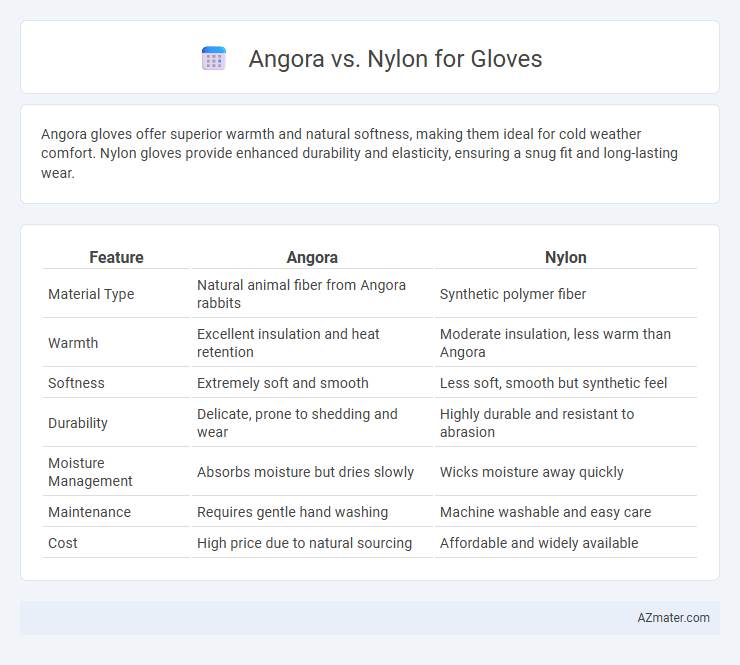Angora gloves offer superior warmth and natural softness, making them ideal for cold weather comfort. Nylon gloves provide enhanced durability and elasticity, ensuring a snug fit and long-lasting wear.
Table of Comparison
| Feature | Angora | Nylon |
|---|---|---|
| Material Type | Natural animal fiber from Angora rabbits | Synthetic polymer fiber |
| Warmth | Excellent insulation and heat retention | Moderate insulation, less warm than Angora |
| Softness | Extremely soft and smooth | Less soft, smooth but synthetic feel |
| Durability | Delicate, prone to shedding and wear | Highly durable and resistant to abrasion |
| Moisture Management | Absorbs moisture but dries slowly | Wicks moisture away quickly |
| Maintenance | Requires gentle hand washing | Machine washable and easy care |
| Cost | High price due to natural sourcing | Affordable and widely available |
Introduction to Angora and Nylon Gloves
Angora gloves, made from the soft, insulating fibers of Angora rabbits, provide exceptional warmth and a luxurious feel ideal for cold weather. Nylon gloves offer durability, flexibility, and moisture resistance, making them suitable for active use and outdoor activities. Comparing these materials highlights Angora's superior softness and thermal insulation versus Nylon's practicality and resilience.
Material Composition: Angora vs Nylon
Angora gloves are made from natural fibers derived from Angora rabbits, known for their exceptional softness, warmth, and luxurious texture, making them ideal for cold weather. Nylon gloves consist of synthetic fibers, offering high durability, elasticity, and moisture resistance, which enhances grip and flexibility during various activities. The primary distinction lies in Angora's natural insulating properties versus Nylon's strength and quick-drying capabilities, influencing comfort and performance in glove usage.
Warmth and Insulation Comparison
Angora fibers provide superior warmth and insulation due to their hollow core structure, which traps air efficiently and retains heat better than nylon. Nylon gloves, while durable and moisture-resistant, lack the natural insulating properties of Angora, making them less effective in extreme cold conditions. The thermal performance of Angora gloves is markedly higher, offering enhanced comfort and protection against low temperatures.
Comfort and Softness: Which Feels Better?
Angora gloves offer superior comfort and softness due to their natural fibers, which provide exceptional warmth and a silky texture against the skin. Nylon gloves, while more durable and stretchable, often lack the plush feel and breathability that Angora delivers. For those prioritizing a luxurious, cozy glove experience, Angora generally feels better and more comfortable.
Durability and Longevity of Angora vs Nylon Gloves
Angora gloves offer excellent warmth and softness but tend to be less durable and have a shorter lifespan compared to nylon gloves, which are known for their resistance to abrasion and tearing. Nylon gloves maintain their structural integrity through repeated use and exposure to harsh conditions, making them ideal for long-term durability. While Angora provides superior comfort, nylon's strength and longevity make it the preferred choice for gloves requiring sustained wear.
Breathability and Moisture Control
Angora fibers in gloves provide superior breathability due to their natural hollow structure, allowing better air circulation and moisture wicking compared to nylon. Nylon, being synthetic, tends to trap heat and moisture, reducing comfort during extended wear or in humid conditions. Therefore, Angora gloves excel in moisture control and maintaining dryness, making them ideal for activities requiring temperature regulation and skin comfort.
Allergen Potential and Sensitivities
Angora fibers often trigger allergic reactions due to the presence of animal proteins that can cause skin irritation and respiratory issues in sensitive individuals. Nylon, a synthetic material, generally has a lower allergen potential, making it suitable for those prone to allergies or sensitive skin. Choosing nylon gloves reduces the risk of contact dermatitis, whereas angora gloves demand caution for wearers with known animal fiber sensitivities.
Style and Design Versatility
Angora gloves offer a luxurious texture and natural sheen that elevate sophisticated and classic styles, making them ideal for elegant, vintage-inspired designs. Nylon gloves provide exceptional design versatility with their smooth finish, enabling a wide range of vibrant colors, patterns, and modern cuts suitable for active and fashion-forward looks. Combining these materials can enhance both the tactile appeal and aesthetic adaptability of gloves, catering to diverse fashion preferences.
Price and Value Considerations
Angora gloves typically cost more than nylon gloves due to the premium quality and natural warmth of angora fibers, offering superior insulation and softness ideal for cold weather. Nylon gloves provide a budget-friendly alternative with greater durability and moisture resistance, suitable for versatile daily use but often lack the luxurious feel of angora. Evaluating price versus value depends on the need for warmth and comfort, where angora offers higher value for cold climates, while nylon provides cost-effective practicality.
Best Uses: Choosing the Right Glove for You
Angora gloves offer unmatched warmth and softness, making them ideal for cold-weather activities like outdoor walking and driving, where insulation and comfort are priorities. Nylon gloves excel in durability, moisture resistance, and flexibility, suited for sports, work tasks, or wet conditions requiring strong, lightweight protection. Selecting between Angora and Nylon gloves depends on your need for warmth or practicality in specific environments, ensuring optimal hand protection and performance.

Infographic: Angora vs Nylon for Glove
 azmater.com
azmater.com